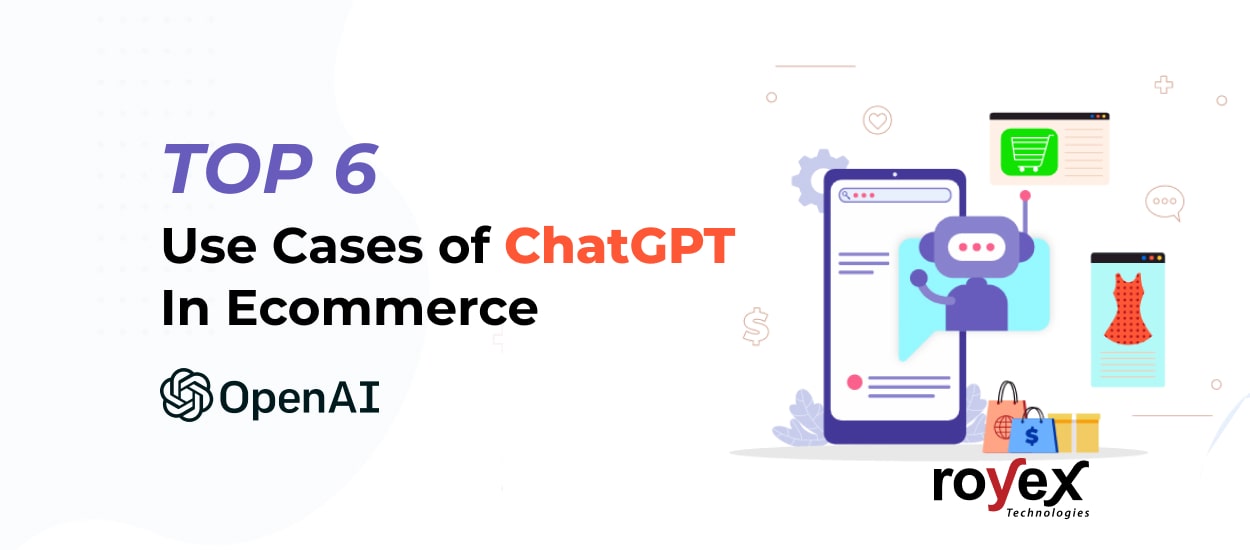
Top 6 Use Cases of ChatGPT In Ecommerce
Ecommerce is a rapidly growing industry, with more and more businesses turning to online platforms to sell their products and services. As such, customer competition is fierce, and businesses must constantly find new and innovative ways to stand out from the crowd. One tool that is increasingly being used by ecommerce businesses is ChatGPT, a language generation model developed by OpenAI.
ChatGPT, the powerful language model created by OpenAI, has the potential to revolutionize the way ecommerce businesses approach content marketing. By leveraging the capabilities of this AI tool, ecommerce companies can streamline their research and content creation processes, ultimately allowing them to better engage with their customers and drive sales.
As eCommerce grows, businesses search for ways to stand out in a crowded market. One solution that has gained popularity is using chatbots, and ChatGPT, developed by OpenAI, is an advanced option for eCommerce companies. With the ability to engage in conversation and respond accurately and intelligently, ChatGPT offers a level of customer service that sets it apart from traditional chatbots.
One of the key benefits of ChatGPT is its ability to admit mistakes, challenge incorrect information, and reject inappropriate requests. This ensures that the customer experience is both efficient and effective. Additionally, during the research preview, the usage of ChatGPT is free, making it a cost-effective solution for businesses.
As eCommerce retail sales are projected to reach $8.1 trillion by 2026, investing in the latest technology like ChatGPT can give your eCommerce business a competitive edge. It's a powerful way to future-proof your business and improve customer satisfaction.
Here are the top 6 use cases of ChatGPT in ecommerce.
Use Cases of ChatGPT In Ecommerce
One of the most powerful applications of ChatGPT in ecommerce is its ability to quickly and easily conduct research. For example, an ecommerce company selling outdoor gear can use ChatGPT to gather information about the latest camping equipment, hiking trends, and other relevant topics in a matter of minutes. This can save hours that would otherwise be spent manually searching for information.
Another benefit of using ChatGPT in ecommerce is its ability to generate great starting points for content. Because the software can understand how to write complete sentences and paragraphs, it can quickly pump out a great framework for articles, blog posts, and product descriptions. This can be a great starting point for your team to work inside, saving time and effort.
ChatGPT can also be a great source of new ideas for ecommerce businesses. For example, you could ask it to generate ten ideas for blog posts about a specific product or topic, and it will spit out a list of potential ideas in no time. This can help to generate new content ideas and keep your website fresh and engaging.
Additionally, ChatGPT can assist in creating product descriptions; it can help to write product descriptions that are more informative, engaging, and persuasive. Providing detailed information about the product and its benefits, it can help to boost sales and customer satisfaction.
While ChatGPT is a powerful tool, it's important to remember that there are still some limitations to what it can do. For example, it can’t provide sources; it cannot fact-check itself, doesn’t have opinions, and is trackable by search engines. However, with the right approach and a little creativity, ecommerce businesses can still make the most of this innovative technology.
Automating product descriptions
ChatGPT can be used to write eCommerce product descriptions by training the model on a dataset of product descriptions and fine-tuning it to your specific eCommerce industry and brand voice. Once trained, ChatGPT can generate unique and engaging product descriptions for new products, saving time and effort for eCommerce businesses.
ChatGPT can also be used to optimize existing product descriptions by suggesting improvements and identifying any inaccuracies. This can help to increase the visibility and conversion rates of products on eCommerce websites.
With its natural language processing capabilities, ChatGPT can also assist in creating product titles and bullet points that are optimized for search engines. Furthermore, ChatGPT's ability to understand the context of the product and its features can be used to create personalized product recommendations for customers.
Product recommendations
Using ChatGPT to recommend products in eCommerce can be done by training the model on a dataset of products and their attributes, such as product category, price, and customer reviews. ChatGPT can then use this information to understand the context of a customer's request and recommend relevant products.
For example, if a customer asks for a "budget-friendly laptop," ChatGPT can search its dataset for laptops that fit that criterion and recommend options to the customer. ChatGPT can also consider a customer's previous purchase history and browsing behavior to make more personalized recommendations.
This type of application of ChatGPT can help eCommerce businesses increase sales and customer satisfaction by providing a more convenient and efficient shopping experience.
Customer service
ChatGPT can be used to enhance ecommerce customer service by providing accurate and intelligent responses to customer inquiries. Its conversational flow allows it to understand the customer's needs and provide relevant information.
For example, it can assist with product recommendations, help with order tracking, and provide troubleshooting assistance. Additionally, its ability to admit mistakes, challenge incorrect premises and reject inappropriate requests ensures that customers receive the best possible service.
This can lead to increased customer satisfaction and loyalty, ultimately driving more sales and revenue for the business. Using ChatGPT for customer service can also help reduce the workload on human customer service representatives, allowing them to focus on more complex issues.
Personalized emails to customers
Using ChatGPT for personalized customer emails can be a powerful way to increase engagement and sales. The ability of ChatGPT to understand and respond to customer interactions in a conversational flow can be used to generate personalized emails that are tailored to the individual customer's needs and preferences.
For example, ChatGPT can analyze a customer's previous purchase history and browsing behavior to recommend products that they may be interested in. It can also use natural language processing to understand customer inquiries and provide accurate and helpful responses. This can help to increase customer satisfaction and loyalty.
In addition, ChatGPT can be used to write personalized email subject lines and content that will grab the customer's attention and increase the chances of the email being opened and read.
While there are some limitations to using ChatGPT for personalized emails, such as a need for more knowledge about current events and an inability to express opinions, it can still be a valuable tool for businesses looking to improve their email marketing efforts.
Social media marketing
Social media marketing for ecommerce using ChatGPT can involve several strategies, such as:
Creating engaging content: Use ChatGPT to generate compelling product descriptions, social media posts, and influencer outreach messages to attract potential customers to your ecommerce store.
Personalized communication: Use ChatGPT to generate personalized customer messages based on their browsing and purchase history.
Customer service: Use ChatGPT to train a chatbot that can handle customer inquiries and provide real-time assistance.
Product recommendations: Use ChatGPT to generate personalized product recommendations for customers based on their browsing and purchase history.
Influencer Outreach: Use ChatGPT to generate personalized messages for influencers that are more likely to convert into collaborations.
Quality Control
Quality control using ChatGPT in ecommerce can involve several strategies, such as:
Grammar and spelling check: ChatGPT can be used to check product descriptions, customer reviews, and other written content for grammatical errors and spelling mistakes. This can help ensure that the content on an ecommerce website is accurate and professional.
Fact-checking: ChatGPT can be used to check the accuracy of information provided in product descriptions and customer reviews. This can help ensure that customers receive accurate and reliable information about products.
Flagging inappropriate content: ChatGPT can be used to flag inappropriate content in customer reviews, such as offensive language or false claims. This can help ensure that customers have a positive experience on the ecommerce website.=
Sentiment Analysis: ChatGPT can be used to analyze customer reviews and feedback to identify patterns of sentiment and to detect any negative sentiment.
Image and Video Quality Control: ChatGPT can be used to check the quality of images and videos that are used in product pages and ads.
In conclusion, ChatGPT has the potential to revolutionize the way ecommerce businesses approach content marketing. By leveraging its research capabilities, content creation abilities, and new idea generation, ecommerce companies can save time and resources while better engaging with their customers and driving sales. It's important to remember that while it is powerful, it has its limitations, but with the right approach, it can be an invaluable tool for any ecommerce business.
How can Royex Technologies help?
Royex Technologies can help companies integrate AI-based solutions like ChatGPT into their business operations. We can facilitate adding your website's custom content to ChatGPT and training chatGPT to customize its response. We can also develop ChatGPT APIs to easily integrate the power of GPT into their applications and create advanced language-based features, such as natural language understanding, text generation, and chatbot capabilities.
Contact us to learn more about our ChatGPT services. Contact us via email at info@royex.net or call us at +971566027916 with your requirements.




